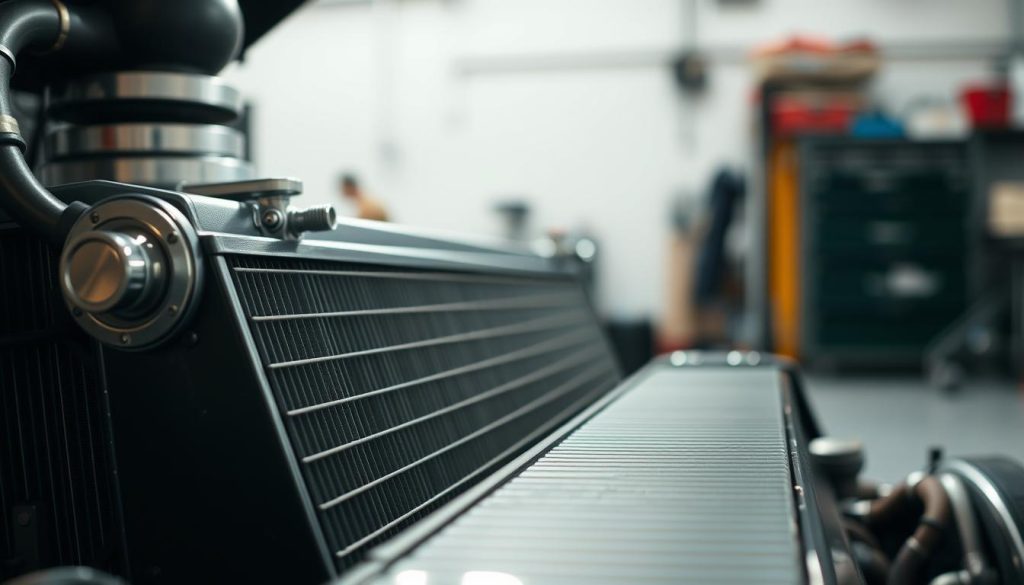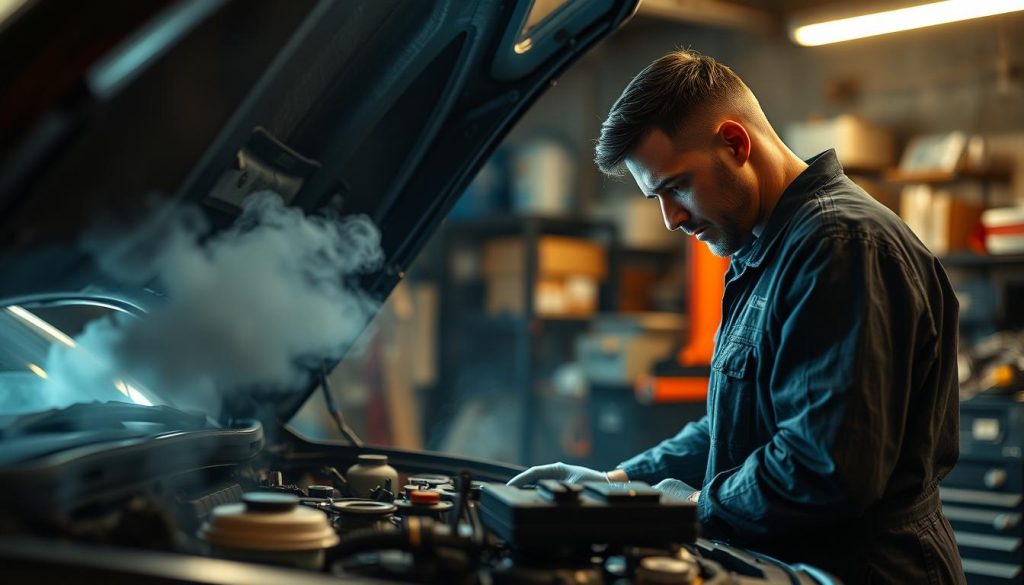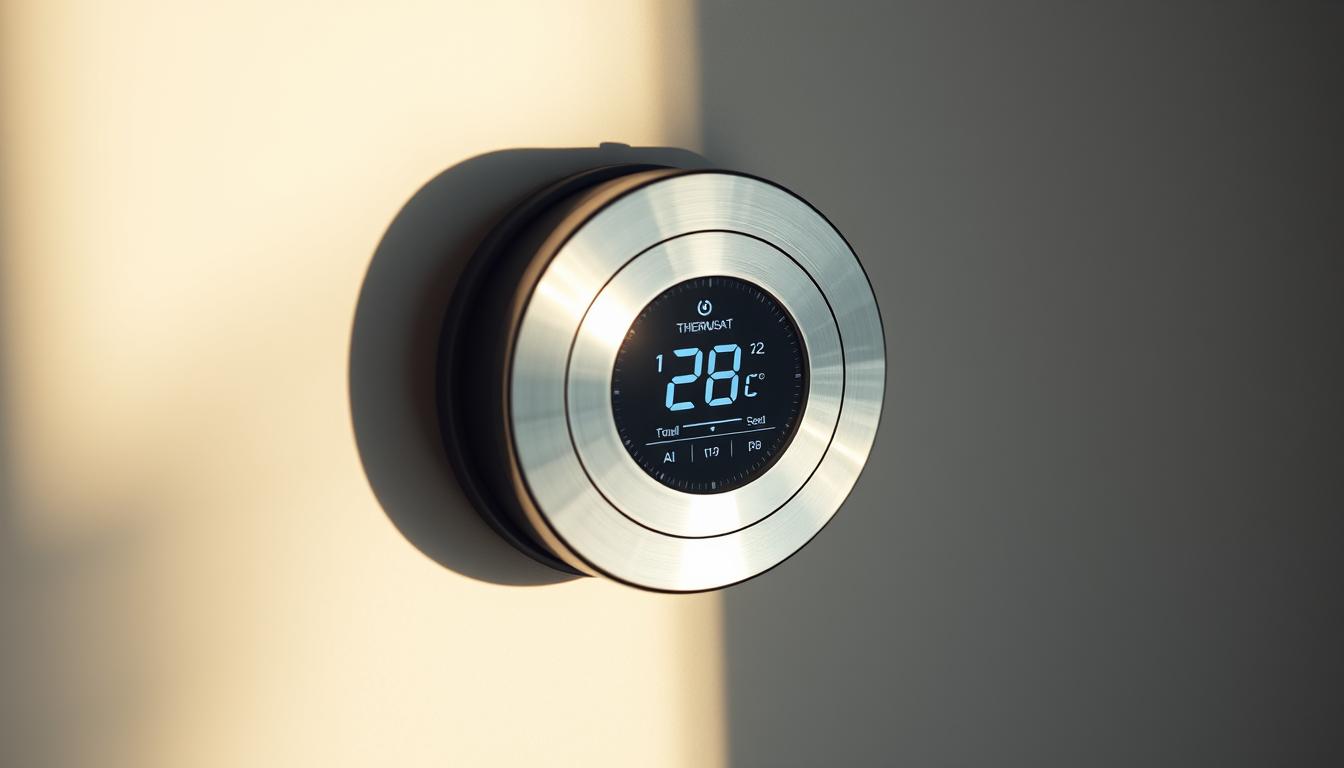Ever been driving and your temperature gauge hits the red zone? Or seen steam coming from your hood? It’s a scary moment that can happen to anyone. Knowing how to handle an overheating engine is key for your safety and can prevent expensive fixes.
An overheating engine can stem from many issues, like a bad thermostat. Knowing what causes it is the first step in overheating car troubleshooting. By finding the problem’s source, you can fix it right.
If your car is overheating, you must act fast. At Heaven Automotive, we’re experts in fixing overheating engines. Let us help you get back on the road safely.
Key Takeaways
- Recognize the signs of an overheating engine to ensure your safety on the road.
- A faulty thermostat is a common cause of engine overheating.
- Understanding the causes is crucial for effective troubleshooting.
- Prompt action can prevent costly repairs.
- Professional help is available at Heaven Automotive.
Common Causes of Car Overheating
Knowing why a car overheats is key to fixing it. The cooling system keeps the engine at the right temperature. If it fails, the engine can get too hot.
Low Coolant Levels or Leaks
Low coolant levels make a car overheat. Coolant absorbs heat from the engine and moves it to the radiator. A leak lowers coolant levels, causing the engine to overheat. Check coolant levels and look for leaks often to avoid this.
Faulty Thermostat Issues
A faulty thermostat stops coolant from flowing right, causing overheating. It controls the engine’s temperature by managing coolant flow. If it gets stuck, coolant can’t move, and the engine overheats.

Radiator Problems and Blockages
The radiator cools the coolant, which cools the engine. Radiator problems, like blockages or leaks, stop it from cooling. Regular maintenance, like flushing the radiator, can prevent these issues.
Water Pump Failures
The water pump circulates coolant through the engine. A failing water pump means coolant doesn’t move well, causing overheating. Look for leaks, rust, or odd noises to spot a failing pump.
Understanding these causes helps car owners prevent overheating. This keeps the engine cool and running well.
Overheating Car Troubleshooting: Warning Signs and DIY Fixes
When your car overheats, it’s crucial to act fast. Ignoring the signs can damage your engine badly.
Temperature Gauge Reading High
A high temperature gauge is a clear sign of overheating. If it’s in the red, your engine is too hot.
Steam Coming from Under the Hood
Steam or coolant leaks under the hood are warning signs. They might mean a cooling system leak or a cracked engine block.
Simple Fixes You Can Try
Try these DIY fixes before calling a mechanic. Turn off the air conditioner and turn on the heater. Then, pull over and check the coolant level.
Checking and Adding Coolant
Make sure the coolant level is right. If it’s low, mix equal parts coolant and water to add. Be careful with the radiator cap, as it might be pressurized.
Inspecting for Visible Leaks
Look for leaks around the radiator, hoses, and water pump. Fix any leaks you find to avoid more damage.
When DIY Solutions Aren’t Enough
If your car still overheats after trying these DIY fixes, it’s time for a mechanic. Overheating can mean a serious problem that needs a pro’s help.
Emergency Steps When Your Car Overheats
If your car overheats, you must act fast to avoid damage. Overheating can seriously harm your engine. This could lead to expensive repairs or even engine failure.
Immediate Actions to Take
When your car overheats, pull over to a safe location right away. Turn off the engine and let it cool. Never remove the radiator cap or expansion tank cap when the engine is hot, as this can cause severe burns. If you need to top up the coolant, use a mixture of coolant and water.
- Pull over to a safe location immediately
- Turn off the engine and let it cool
- Avoid removing the radiator cap when hot
What Not to Do When Overheating Occurs
It’s also key to know what not to do. Avoid driving your car further if it’s overheating, as this can make things worse. Don’t try to cool the engine by pouring water on it, as this can cause damage.
The Cost of Ignoring Overheating Problems
Ignoring overheating issues can lead to serious engine damage, resulting in costly repairs. In severe cases, it may require a new engine. At Heaven Automotive, we can diagnose and fix overheating problems to keep your engine running smoothly. 
If you’re experiencing overheating issues, don’t hesitate to contact us for professional assistance.
Conclusion: Keeping Your Engine Cool and Reliable
Regular maintenance is key to avoiding car overheating. Knowing the common causes helps you stay ahead. Regular coolant checks and exchanges can spot problems early.
If your car overheats and you’re not sure why, see a mechanic. At Heaven Automotive, our skilled team can find and fix any issues. We’ll get you back driving safely and efficiently.

